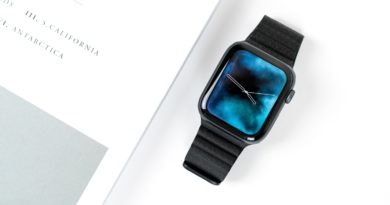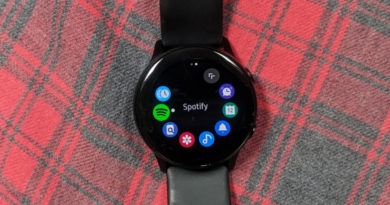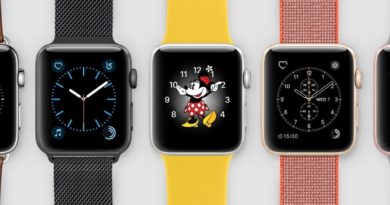Emporio Armani Smartwatch 3 review
![]()
Now a firm fixture in the Fossil Group’s annual Wear OS launch bonanza, Emporio Armani is back with the third smartwatch from its Connected range.
The fashion house entered the space back in 2017, before expanding with a redesign and more ‘typical’ smartwatch features in last year’s edition.
The changes are more incremental with the unimaginatively-named Smartwatch 3 (also known as the Connected 2019, Matteo or ART5024), and the designer watch has, questionably, retained its usual asking price of £369.
Related reading: Ranking the top Wear OS smartwatches
For reference, that’s just slightly cheaper than the latest Apple Watch, and around £200 more expensive than the Apple Watch Series 3.
Is it a convincing alternative to the best smartwatches currently available? We’ve been putting the Emporio Armani Smartwatch 3 to the test to find out.
Emporio Armani Smartwatch 3: DesignEmporio Armani Smartwatch 3 specsSnapdragon 310044mm aluminum case12mm thicknessSilicone bandSwim-proofNFC for Google PayBluetoothBuilt-in GPSWi-FiBuilt-in speakerGoogle Assistant
With Wear OS lagging behind rivals and offering precious little variance from watch to watch in terms of features, the design is still the most important part of these watches. With an Emporio Armani watch, as well, that’s to be expected.
Each of the Fossil Group’s partners offers a unique take on the modern smartwatch, and Armani appears to have settled into a rhythm with its third iteration.
There’s not much change at first glance. However, on the whole, this touch-up means the design matches the feature set far better than in the last generation.
Read next: Best Wear OS apps to downloadGone are the metal bands and casings, replaced by silicone straps and an aluminum body (available in a number of accents, with our model being the blue).
There’s still the same finer points as the 2018 edition, such as the gap in the casing between bezel and strap, as well as the Armani logo on the crown, but it’s just now more suited to tracking. Less heavy and cumbersome, but still stylish.
The screen, too, is similar to last time around. It’s the same 1.28-inch AMOLED display, with 390 x 390 resolution and 328 pixels-per-inch packed inside a 44mm body. Thankfully, it also retails the 12mm case thickness, so this wasn’t a burden on runs or daily wear. As we show above, that screen can once again be set to always-on, with a touch on the screen or a wrist-raise lighting things up in more detail. This is one of the few things Wear watches beat rivals to the punch on, and it still works great.
Just make sure to experiment with different Armani faces, as some can take a couple of seconds to load up from the dimmed, always-on mode to the full screen, and others can react instantly.
More reading: Set up Google Pay on a smartwatchSomething new to the party, meanwhile, is the speaker on the left side of the bezel. While the device doesn’t offer 4G/LTE capabilities, it does let you take calls from the watch.
We’re not sure who would use it in this capacity, considering you have to have your phone nearby and connected to Bluetooth for it to work, but it’s also there for those who enjoy exercise read-outs or Google Assistant responses. A neat upgrade, albeit admittedly minor.
With slight improvements on what was already a great looking design, the look of this smartwatch is undoubtedly its strongest area.
You could argue the more sporty vibe should have been present in the 2018 model – and you’d probably be right – but let’s just celebrate the fact it’s here now, in what is essentially the Emporio Armani Smartwatch 2.5.
Emporio Armani Smartwatch 3: Wear OSA smartwatch can look as good as the Armani Smartwatch 3, but it’s generally only as good as the operating system backing it up. And, unfortunately, though we’re tired of sounding like a broken record, Wear OS by Google is still a mediocre operation.
Speed has improved since the introduction of the Qualcomm Snapdragon 3100 chip, but the bones of Wear OS are still the same.
It’s filled with drab, clunky menus, and the app experience back on your phone doesn’t offer close to the same amount of depth as something like Fitbit.
Guide: Everything to know about Google FitUsing an iPhone for this review (admittedly not as good as pairing to an Android device, but why is that even still an issue in 2019?), you’ll have to download both Wear OS by Google and Google Fit in order to get the most out of your watch, while also linking your Google account at every turn.
All this leads to the overriding feeling that, you know, maybe we don’t need a separate app for Assistant, Wear OS and Fit.
We’re not saying they’re completely useless as standalone apps, but it just feels odd being redirected to the Assistant app when you want to change your settings, for example.
Why can’t the small integration Google Fit has in the Wear OS app be replicated in one revamped edition of the app?
Google Fit, for example, is relatively okay to use, echoing the simplicity of the Google Home app, but, still, the emphasis on Move Minutes and Heart Points makes the whole experience feel like a sub-par imitation of Apple’s rings.
Related reading: How to use Spotify on Wear OSWhat if you actually prioritize sleep stats? What if you’re more interested in metrics like resting heart rate? The fact is, there’s not much scope for choosing health and activity tracking goals, and you’re forced to live by what Google thinks is important.
We’re sure these kinds of gripes won’t bother every user, because you can get by with Wear OS – and there’s still nice integrations with Google Pay, notifications and customizable watch faces.
When compared to immediate rivals, though, there’s just not enough to keep you coming back. This is typified by the pre-installed Spotify app, which lets you control music already playing on another device and little else. Brilliant stuff.
Emporio Armani Smartwatch 3: TrackingSo, Wear OS is still Wear OS. For those who don’t mind the platform, though, it’s important to know whether the activity tracking features touted in the Gen 5 Fossil Group line-up, and in this watch, can outperform last year’s so-so models.
GPS performanceThe location tracking sensor was first introduced in the Fossil Group’s Gen 4 models, and it naturally makes a return for this year’s editions.
We were hoping for a better performance than with the Emporio Armani Connected 2018, which refused to work, but, exhaustingly, the same issue occurred here.
The Smartwatch 3 had no issues with using the GPS connection of the paired iPhone, but if we were to leave the phone behind (like we attempted on two occasions), we’d be met with a never-ending “Acquiring GPS” tag before starting a run.
Initially, we suspected this could be a user error, but our location permissions were all switched on and, like last year, we’re left to believe that, at best, our sample is faulty, or, at worst, the feature is just simply unreliable/unusable across the entire range.
Heart rate accuracyThankfully, the heart rate sensor on the underside of the watch was more reliable in testing. The above example fairly indicative of what we found in three test runs against the Fitbit Versa 2.
While last year’s model slightly over-reported average heart rate, this time around it was always within 1-2 bpm, or, as above, right in line with the Versa.
It also managed to keep up with the Versa when we had to stop in the rain to re-tighten it, and jumped straight back up when we began running again.
Of course, as we alluded to in the section above, the heart rate data you get from Google Fit isn’t as in-depth as you’ll get from Fitbit, but the fact you can rely on it is good enough to get a tick of approval here.
Emporio Armani Smartwatch 3: Battery lifeFor years, battery life has been the same equation on Wear OS watches. And while you still won’t be getting multiple days of life between charges, battery efficiency has improved between the Smartwatch 3 and last year’s model.
How quickly a watch drains, obviously, always depends on how you’re using it. However, through Wear OS, and likely largely due to the extra processing power provided by Snapdragon 3100 chip, you now have a number of battery modes to choose from.
This means that you can have the choice to go for a day of heavy usage and charge later that evening, or you can strip back features like heart rate and the always-on display and eke things out a little longer. Read this: How to reset a Wear OS smartwatchSo, for example, on the Essential battery mode, Bluetooth will only be available between 6am and 10pm, the speaker functionality will be turned off and the device won’t track your location.
You can even create a custom setting, if your watch usage is consistent and you want to be able to rely on it getting through a full 24 hours. There’s even a Time Only setting, which you can get weeks on a full charge.
Obviously, we’d prefer it if the smartwatch had more than the standard 18-20 hours we found in full use, but at least there’s now options.
Emporio Armani Smartwatch 3
By Emporio Armani
The third smartwatch from Armani delivers an improvement on the first two models in both design and functionality, but Wear OS, and therefore many of the same issues, plagues the wider experience. It costs nearly the same as the Apple Watch Series 5, yet it sits miles away in both usability and performance. The GPS issues are unforgivable, the addition of the speaker is minor and this detracts from the new battery modes, design tweaks and solid heart rate accuracy.
Classic, sporty design
Strong heart rate accuracy
New battery modesGPS tracking is non-existent
Poor value for money
It runs Wear OS


